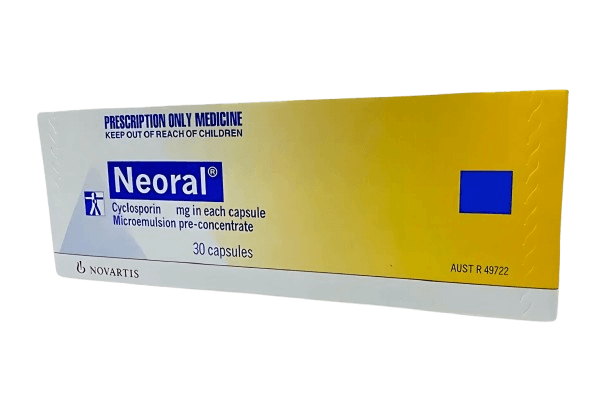Cyclosporine
Cyclosporine is commonly sold under brand names such as Neoral, Gengraf, and Sandimmune.
Cyclosporine is an immunosuppressive medication commonly used to prevent organ rejection in patients who have undergone transplants, such as kidney, liver, or heart transplants. It works by suppressing the immune system to prevent it from attacking the transplanted organ. Cyclosporine is also used to treat certain autoimmune diseases, such as severe rheumatoid arthritis and psoriasis, when other treatments have not been effective. By reducing immune system activity, Cyclosporine helps control inflammation and prevent tissue damage caused by autoimmune attacks.Tablets & Capsules
Topical Solutions
Control Skin Issues
100% Authentic
Our Inventory
Image | Name | Type | Strength | Manufacturer | Contact Us |
 | Neoral | Capsule | 25mg,50mg, 100mg | Novartis |
Directions
- Take Cyclosporine exactly as prescribed by your healthcare provider, usually twice daily.
- Take the capsules or oral solution consistently, either with or without food, but always the same way each time.
- If you are using the oral solution, measure the dose carefully with the provided dosing syringe.
- Do not switch between different brands of Cyclosporine without consulting your doctor, as brands may not be interchangeable and can have different absorption rates.
- Continue to take Cyclosporine as directed, even if you feel well, to prevent organ rejection or control your autoimmune condition.
Special Precautions
- Inform your doctor if you have a history of kidney or liver disease, high blood pressure, infections, or any other serious health condition before starting Cyclosporine.
- Cyclosporine can increase your risk of infections. Report any signs of infection (such as fever, sore throat, or unusual fatigue) to your doctor immediately.
- Regularly monitor your blood pressure and kidney function while on Cyclosporine, as it can increase blood pressure and may cause kidney damage.
- Avoid grapefruit and grapefruit juice while taking Cyclosporine, as they can interfere with the medication’s metabolism and increase the risk of side effects.
- Cyclosporine can weaken your immune system, increasing your risk of skin cancer. Limit sun exposure and wear sunscreen and protective clothing when outdoors.
- If you are pregnant, planning to become pregnant, or breastfeeding, discuss the risks and benefits of taking Cyclosporine with your healthcare provider, as it may not be safe during pregnancy.
Side Effects
Common side effects of Cyclosporine may include:
- High blood pressure
- Tremors
- Excessive hair growth
- Gum swelling
- Nausea
Serious side effects may include kidney damage, liver damage, increased risk of infections, and increased risk of certain cancers. Contact your healthcare provider immediately if you experience symptoms such as yellowing of the skin or eyes, dark urine, persistent nausea, unusual tiredness, or any signs of infection.
Missed Dosage
If you miss a dose of Cyclosporine, take it as soon as you remember. If it is close to the time of your next dose, skip the missed dose and take the next one at the regular time. Do not double the dose to make up for a missed one.
Storage Requirements
- Store Cyclosporine at room temperature, between 68°F and 77°F (20°C to 25°C), away from moisture and direct sunlight.
- Keep the medication in its original container and tightly sealed when not in use.
- Keep out of reach of children and pets.
